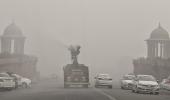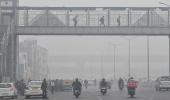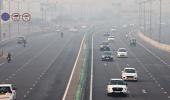'Many of these patients arrive at emergency departments in distress, struggling to breathe and requiring immediate medical intervention.'

Hospitals are witnessing a 40 to 50 per cent surge in patient visits due to respiratory illnesses, including symptoms of bronchitis and breathlessness, with major cities recording a severe jump in air pollution levels in the last 20 days.
Dr Mayank Saxena, additional director, pulmonology, Fortis Hospital, Noida, said he has seen a nearly 50 per cent increase in the number of outpatient department (OPD) visits and admissions compared to previous months.
Several North Indian cities, on Tuesday, recorded an air quality index (AQI) exceeding 350, considered to be very poor, according to Central Pollution Control Board (CPCB) data updated till 4 pm.
While Delhi recorded an AQI of 460, the adjoining cities of Ghaziabad, Gurugram and Noida also crossed 350. Prolonged exposure to this can lead to respiratory illness.
"On Tuesday, I saw around 21 patients till 3 pm already, while my average OPD used to be around 9 to 10 patients. This is a 50 per cent increase," said Dr Kuldeep Kumar Grover, consultant, pulmonology at the C K Birla Hospital, Gurugram.
Majority of patients reporting at OPD include those who have no history of respiratory illness. They are facing persistent cough, throat irritation and nasal discharge.
"Few patients are also showing symptoms of choking, breathlessness and wheezing, which are symptoms of acute bronchitis," Dr Saxena said.
"Here, the patient may require admission and aggressive treatment, including nebulisation and intravenous (IV) antibiotics," Dr Saxena explained.
Government hospitals in Delhi are also seeing a surge in pulmonology OPDs, with the Ram Manohar Lohia Hospital's special pollution OPD recording increased footfalls.
"We are seeing rising footfall every week with patients complaining of watery eyes, itching, chest tightness and bronchitis," an on-duty doctor said.
While the impact of pollution is not limited to specific age groups, persons with comorbidities like asthma and common obstructive pulmonary disease (COPD) are being considered more vulnerable to pollution-derived illnesses.
Dr Arjun Khanna, head of department, pulmonary medicine at Faridabad's Amrita Hospital, said asthma and COPD patients are experiencing acute exacerbations more frequently.
"Many of these patients arrive at emergency departments in distress, struggling to breathe and requiring immediate medical intervention," he added.
On Tuesday, Mumbai, too, was in the dangerous category, with its AQI crossing 120 for the first time this season.
According to Dr Salil Bendre, director (pulmonology), Nanavati Max Super Speciality Hospital, Mumbai, patient footfalls in the city have gone up by 20 per cent.
"There has been a 10 per cent increase in admissions due to respiratory illness, with persistent cough requiring medicines and nebulisation," he added.
Apart from respiratory issues, patients are also suffering from migraine, headaches, and eye and skin problems.
"Patients are complaining about ear-related problems like pain, inflammation, and swelling, which is more common during the colder months," said Dr Samir Garde, director, department of pulmonology and lung transplant at Parel's Gleneagles Hospitals.
Dr Saxena added that entry of any pollutant in a human body can cause infections, be it the nostrils, eye, mouth or skin.
"We are seeing cases with burning sensation in eyes, watering of eyes and nasal discharges, skin irritation, sore throat, coughing and breathlessness," he said.
Feature Presentation: Ashish Narsale/Rediff.com












 © 2025
© 2025